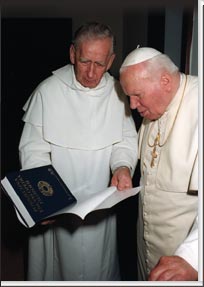|
|
|
|
|
|
|
|
|
|
|
 |

Metaphilosophy Krąpiec's conception of philosophical cognition is rooted in the classical understanding of science elaborated throughout the Platonic and Aristotelian tradition. The base for scientific knowledge here is pre-scientific common-sense cognition, and the objective reason for conceiving the thing in the explanation of reality has always been emphasized. The question of "why?" namely, why the whole of reality exists, is the predominant and first question in philosophical cognition. This conception of knowledge is presented in opposition to various conceptions dominant in the philosophies and methodologies of 20th century, conceptions that follow Kant (presenting various a priori ideas in establishing scientific cognition) or Comte (making science into a mere tool subordinate the higher goal of utility). Krąpiec's conception of philosophical knowledge is constructed upon cognitive realism. Philosophy of this kind is able to provide us with universal (analogous) cognition and with concrete, particular cognition. The methodological principles of such a scientific attitude are the principle of historicity (including the postulate that we should make use of solutions that have been proposed throughout history, in a positive sense and in a negative sense), the principle of cognitive neutrality, especially as far as the starting point of scientific cognition is concerned, and the principle of objective explanation. As far as the philosophy is concerned the fact of existence of being is such a neutral starting point. Philosophy is a rational type cognition that searches for the ultimate justification for whatever exists. The starting point for philosophy is common-sense cognition as the prime intuition of real world. The destination here is the explanation of the fact taken into consideration, that means the indication of a necessary and objective factor that would allow us to explain ultimately an investigated fact. |